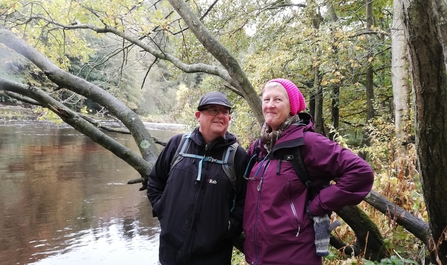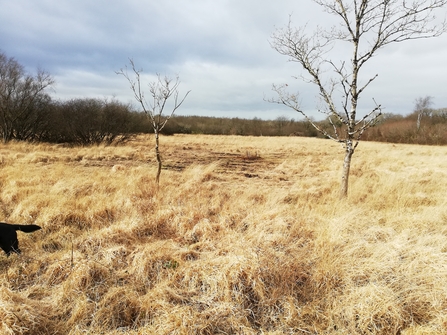We moved to Beer Mill in 1998, 25 years ago, searching for a simpler life, more connected to our surroundings in a rural environment. Despite living in London and the South East for 16 years, we both come from fairly rural but not farming backgrounds. We have always felt drawn to a more environmentally friendly and less commercial lifestyle; growing our own food, recycling, reusing and repairing are all inherited traits from our parents as children of the 1960s. We fell in love with Beer Mill because of the proximity to water, a stream runs through the garden, the messy woodland, and the moors and the ocean are not far away. We bought Beer Mill with 13 acres of land and the first thing we did was plant our own millennium woodland with financial assistance from the Woodland Grant scheme. Our children attended the local primary school and we found that there had been a history of nature walks from the school to Beer Mill which we decided to rekindle and continue with this relationship today.
The story of Beer Mill Farm Conservation Project
Beer Mill Farm

Elaine and Richard Green
In 2003 we bought the neighbouring property as the owners retired and moved away. Beer Mill expanded to 45 acres in total. Uncertain how to manage everything, we attended a DWT course called “Confidence in the Countryside” at the nearby Cookworthy base. DWT have been supporting, advising and guiding us ever since then. We have learned from visiting DWT sites and following their management techniques. In 2010 we bought more neighbouring land which had been lying untouched for a number of years but we suspected it included some valuable culm grassland. Beer Mill was now 130 acres/55 hectares and with help of DWT we successfully applied for our first Higher Level Stewardship scheme. A mixed blessing – yes we got assistance with funding to do all the work we wanted which included scrub clearance, restoring and expanding the culm grassland, laying hedgerows to create wildlife corridors, managing woodland, improving the bio-diversity across the farm but we did have to follow prescriptions which were sometimes a compromise for us eg using barbed wire throughout the farm. Other issues were having to fund purchasing and work up front and claiming the money back afterwards which doesn’t cover VAT or in fact the cost of all the materials and labour, but we had no choice as capital works had to been completed in the first 3 years. Overall HLS helped to cover some of the cost of the conservation work we wanted to achieve. In 2020, with the uncertainty of Brexit, rural payment schemes and government priorities in the balance, we continued in the scheme for one more year then left because of calendar complications with applying for a new scheme.

Beer Mill Farm
We harboured grave doubts about signing up for a new scheme but on balance we opted in as our next goal was to create a woodland connective corridor throughout the farm from South to North and on the face of it some money/advice to help with this project was better than none. Our doubts were not misplaced, and it has been a complicated struggle and still is.
However, the good news is that, as I write we have planted a further 600 trees in our regeneration zones, thanks to DWT Upstream Thinking and Saving Devon’s Treescapes. We have been working to restore wildflower meadows where the soil is suitable and will hopefully we will be green haying further areas this coming summer. We have created a network of wildlife ponds and ditches across the farm. Our Woodland Wildlife Corridor of 6000 native broadleaf tree species will be planted in March and autumn this year. Our wildlife monitoring has shown a marked improvement in bio-diversity and we have recorded many invertebrate, amphibian mammal and bird species on camera traps and regular survey walks by ourselves and with experts which we do our best to pass on to the Mammal Society, DBRS and RSPB. Over the years we have welcomed approximately 200 school groups and introduced students, teachers and parents to the joys of wildlife.
We have never opened Beer Mill Farm to the public for a number of reasons although we are happy to offer guided walks (free of charge) to schools and interest groups, and overall we have found that this approach has benefited wildlife and avoided further complications. Think carefully about what you want to achieve and how much a scheme can help you and how much compromise you are prepared to accept. We are happy to share our experiences with anyone interested in going down the same route, so please feel free to get in touch.
